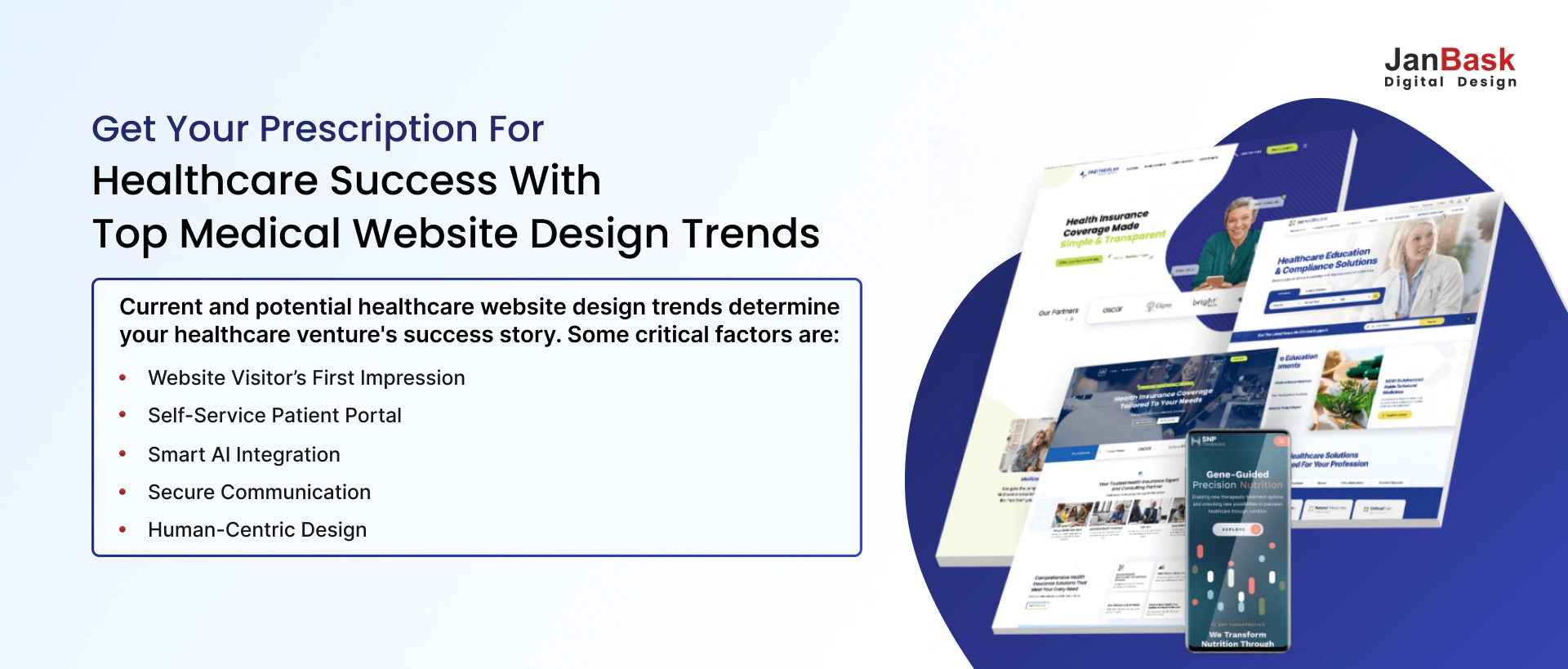
Healthcare in the United States is undergoing rapid changes. With millions of patients searching for doctors, hospitals, and treatments online through platforms like Google, being found on the internet is not just a desirable feature; it’s a necessity. If you’re in a solo practice or a multi-hospital healthcare organization, patients are looking for the services you provide. If your website isn't on the list of results when they search, they will likely make an appointment elsewhere.
That's where healthcare SEO comes in. A well-executed SEO for healthcare approach enables your medical website to rank higher in search engines so that you can reach the right patients at the right time. In fact, SEO for medical websites is now considered essential for practices and hospitals wanting to stay visible and competitive online. Here, we'll present everything you need to know about creating an effective SEO strategy for your healthcare organization. Let's dive in.
Search Engine Optimization (SEO) refers to the process of making your website more accessible to search engines like Google. When a person searches for a phrase like “pediatrician near my location” or “best cardiologist in Chicago,” search engines crawl across millions of websites to identify the most relevant and reputable results. SEO for medical practices ensures your website ranks in the top search results, where most individuals click.
In the healthcare world, SEO operates differently. Search engines take precautions when ranking healthcare-related content, medicine, and patient care. This is because healthcare comes under a type of YMYL “Your Money or Your Life” and Google treats it with special caution because it influences individuals’ well-being. To rank your content well, it should adhere to principles of E-E-A-T, i.e., it should demonstrate Experience, Expertise, Authoritativeness, and Trustworthiness.
Also, healthcare sites have to be HIPAA-compliant and safeguard patient privacy. This implies that, although your content needs to be informative and search-optimized, it should also protect personal health information (PHI). An optimized SEO in healthcare site accomplishes all of the above while serving applicable content, securing patients, and earning trust at every step.
Today’s patients don't just go to the nearest clinic; they research, compare, and make an informed decision. Whether they're searching symptoms, checking up on doctors, or reading reviews, the majority of healthcare experiences start with a Google search. This means if your site doesn't appear, you might as well not be in the game. SEO for hospitals ensures that your practice is visible when patients search for the type of care you offer.
But visibility isn't everything. SEO healthcare strategies also create trust and credibility. A healthcare website that loads quickly, is easy to navigate, provides valuable content, and feels secure to use. Patients and search engines care about these things. In a crowded market like healthcare, where patient choices can affect lives, appearing at the right time with the right content is crucial.
Building a strong healthcare SEO strategy is key to reaching more patients online. By improving your website's visibility and creating valuable content, you can attract the right audience. This guide will show you how to optimize your site, boost your rankings, and connect with more people who need your healthcare services.
Before you tweak a single page, know where you're headed. Success in SEO for healthcare isn’t just about ranking higher or getting more clicks; it’s about real results, like more patient appointments or service inquiries. Set clear, measurable goals that connect directly to your business needs and patient care mission.
Let’s break down how to set the right SEO goals that truly support your healthcare growth.
Start by identifying the business outcomes your practice or healthcare facility wants to achieve. Then connect them to SEO in a meaningful way. Here’s how you can do it:
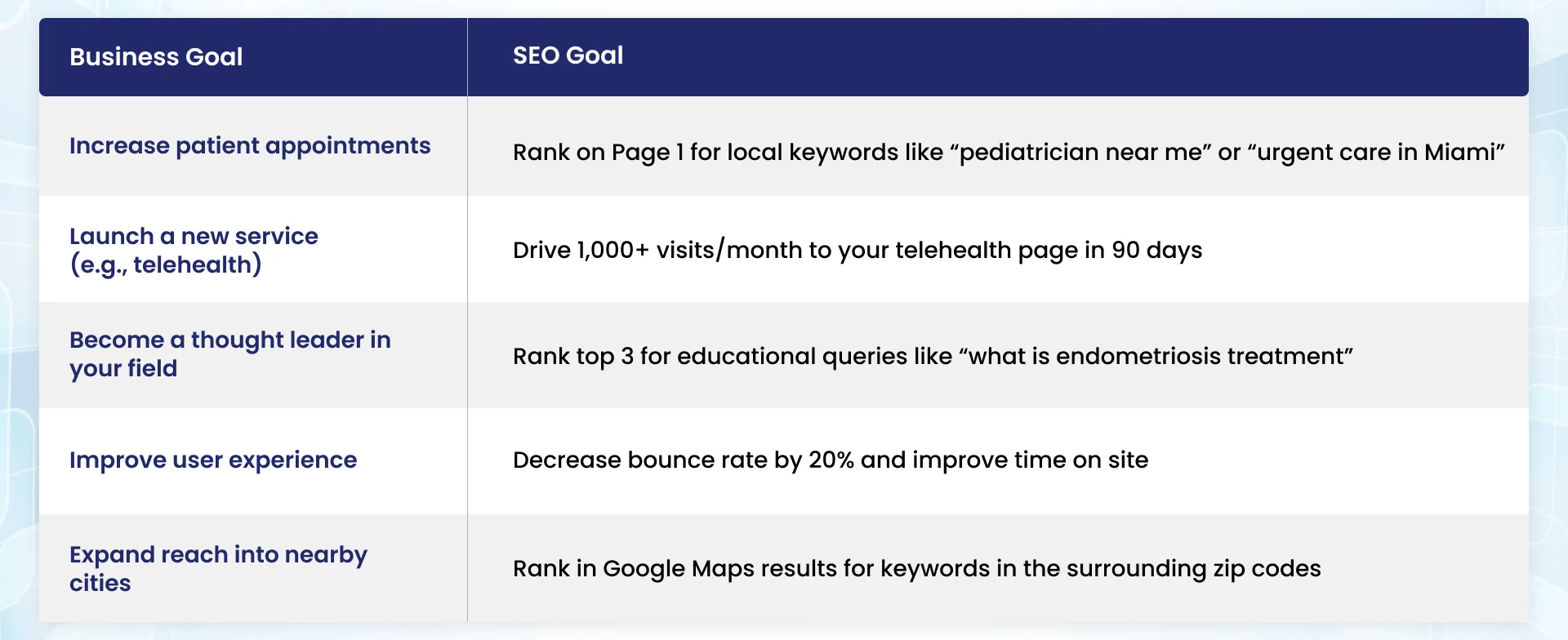
Use the SMART framework:

It's essential to understand patients' searching behavior as part of your SEO for healthcare strategy. Suppose you don't understand how your target market searches for healthcare services, your SEO efforts will likely fall short. Patients search with purpose; some search for symptoms, others for healthcare professionals, and others for specific treatments or procedures. When you understand these patterns of behavior, you're better able to create and optimize your site to provide the answers they're searching for.
Step one is understanding that patients have different search patterns at different points in the patient journey. The following is a delineation of typical search patterns that you need to know about: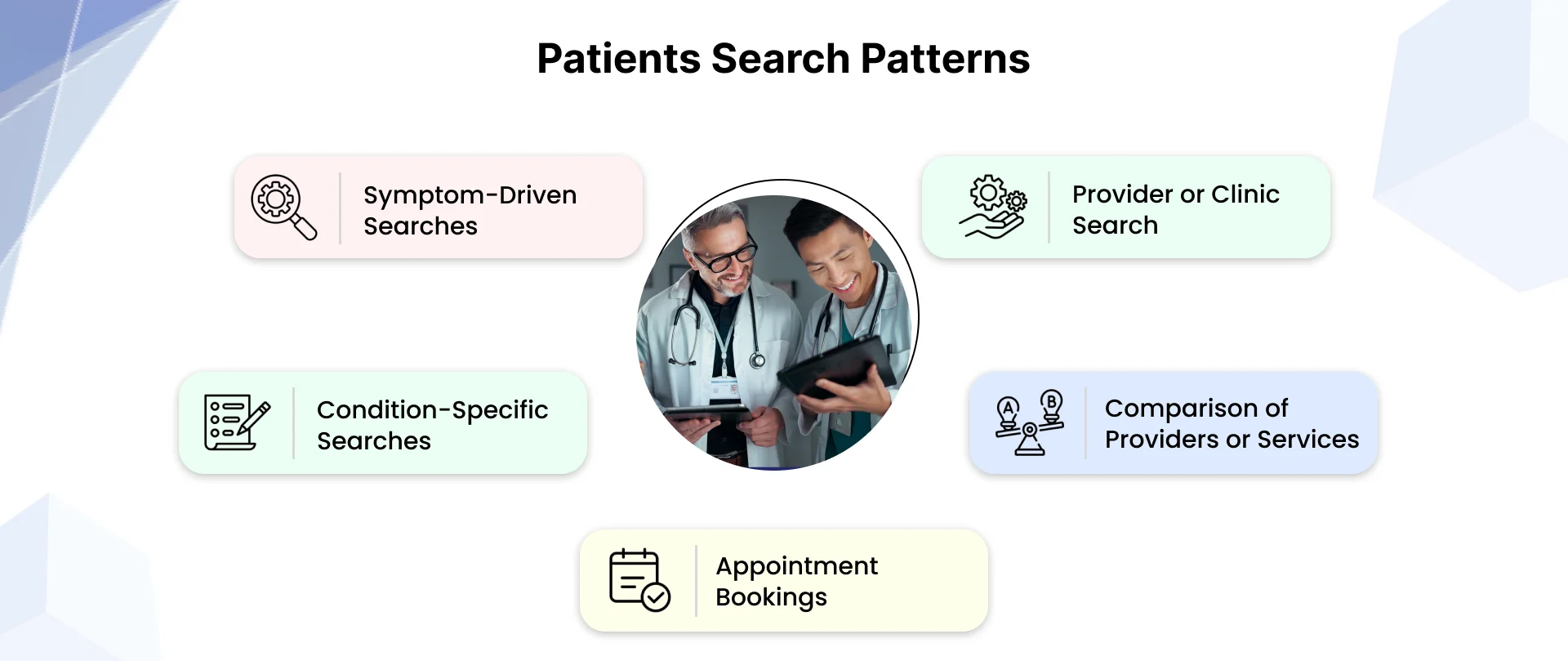
Patients typically initiate searches by looking for symptoms or conditions they are experiencing. For example, they will ask, What are the symptoms of a heart attack? Or why am I experiencing stomach pain? These are informational searches, where patients research and learn. It’s critical to have content that addresses the common symptoms of the conditions your practice treats.
After understanding symptoms, patients may search for specific conditions, such as treatments for chronic migraines or the symptoms of type 2 diabetes. Here, patients are seeking solutions. For this reason, your landing pages should explain the conditions your healthcare facility treats, as well as the related treatment and care services that are available. SEO for hospitals can help ensure that your site ranks well in search results for these queries.
Patients can also search for specific healthcare clinics or providers, such as "the best orthopedic surgeon in New York." This is where local SEO for the healthcare industry becomes critical, ensuring that your business ranks for the right local keywords and gets noticed by potential patients.
Patients often compare providers and services before making decisions. They might search for reviews or pricing information, such as "What is the cost of knee replacement?" or "Best family doctors in Chicago." At this point, it’s important to have reviews, testimonials, and comparison pages that make it easy for patients to evaluate their options. Implementing schema markup for reviews and ratings can help enhance your search engine optimization for medical visibility.
Ultimately, some patients will be ready to book an appointment or consultation. These searches are precise, such as "book a consultation with Dr. X" or "schedule an X-ray appointment in Virginia." Capturing these conversion-oriented searches is crucial for the success of your healthcare website.
SEO for healthcare requires using the correct keywords that match patients' needs and the services provided. The following are ways you should take to perform effective keyword research for your practice:
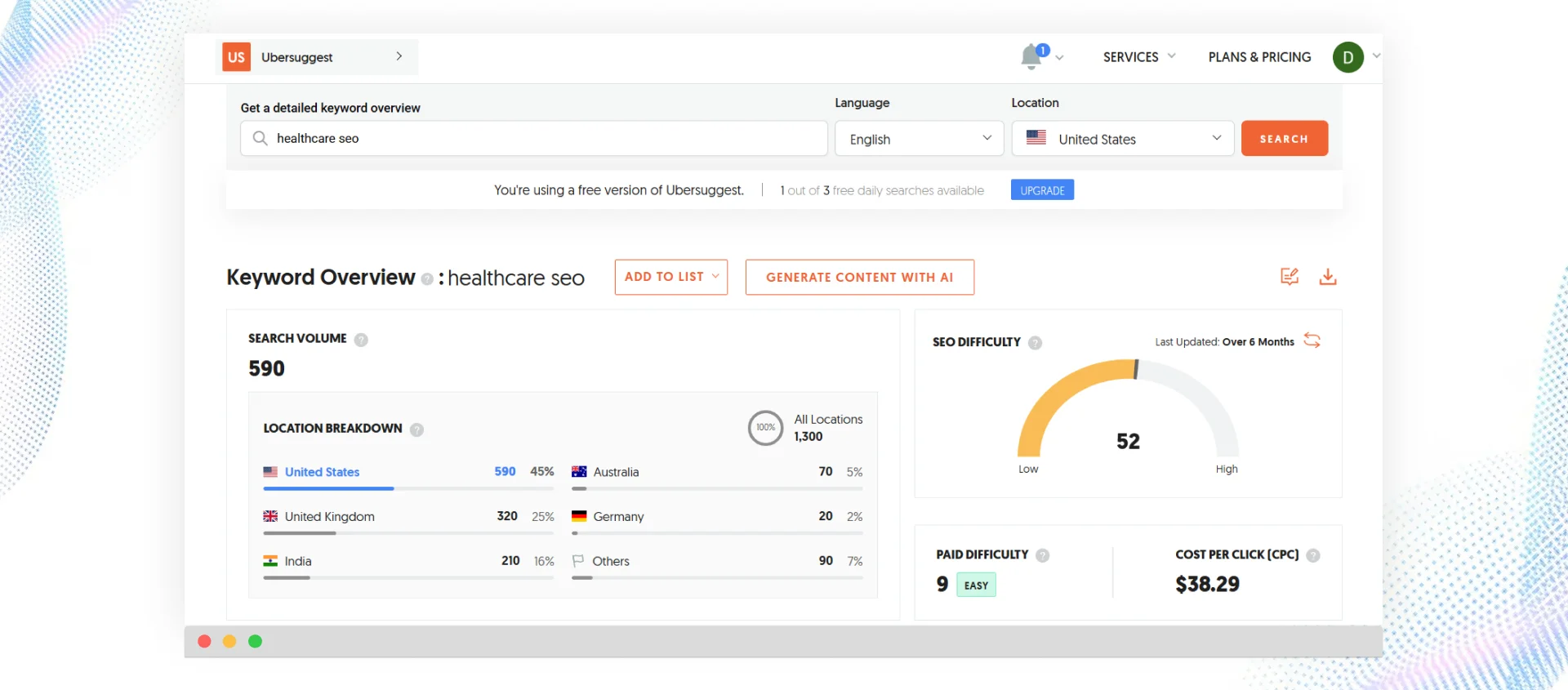
Begin by identifying your fundamental services, including treatments, specialties, and the conditions they treat. For instance, a cardiology practice could target the treatment of heart disease, such as "cardiologists near me" or "chest pain doctor." A well-structured SEO for medical strategy ensures your site ranks for these specific, high-intent searches.
Target long-tail keywords to answer unique patient questions like "symptoms of a stroke" and "best treatment for anxiety." Such keywords generally have lower volumes but greater intent, and they are helpful for conversions. Optimizing these in your SEO for hospitals approach can help reach patients actively looking for specific treatments.
As patients often prefer local healthcare providers, using location-based keywords like "pediatrician in [City]" and "orthopedic surgeon in [ZIP code]" is essential. Local SEO in healthcare ensures that your website appears in searches relevant to your geographic area, and Google My Business plays a critical role in this by helping you stand out in local searches.
Utilize tools like Google Keyword Planner, Ahrefs, or Ubersuggest to identify keyword opportunities. These tools help uncover high-volume and long-tail keywords specifically related to your practice, strengthening your SEO strategy for the healthcare industry and boosting visibility.

Scan your competitors' sites to identify gaps in their keyword strategy. By using tools like SEMrush or Ahrefs, you can see which keywords they rank for and find missed opportunities. This analysis can refine your SEO efforts, helping you target untapped keywords and improve your content.
Map your keywords to applicable content on your website.
Ensuring your content is optimized for both search engines and users through effective On-Page SEO, here’s how to make your healthcare website more visible::
Off-page SEO involves activities performed outside of your website to improve its visibility and ranking. Below are some ways your healthcare website can be optimized with Off-Page SEO strategies:
Linking from high-quality healthcare websites can help increase your site's ranking. Earn links from recognized sources, including medical associations, hospitals, and healthcare publications. For a deeper understanding of effective link-building tactics, check out this guide on how to get backlinks. This signals to Google that your website has authority, which is crucial for SEO healthcare, and overall visibility.
By working with healthcare professionals and influencers, you can boost the visibility of your website. Traffic and backlinks can be garnered through guest posts, interviews, or even social media shoutouts from authoritative industry professionals. This can be a great strategy in SEO for medical marketing, helping build trust and recognition within your field. Take a look at @thatalexrn Instagram post to understand how they stay at the top in healthcare content.

Although social media signals won't directly affect your site's ranking, active engagement will make your site more visible and drive traffic. Publish helpful healthcare tips, blog entries, and patient testimonials to enhance engagement and trust in your brand. This also supports your SEO efforts in the healthcare industry by building an online presence and encouraging patient interaction.
Reviews from patients on Google, Yelp, or Healthgrades play a role in local search rankings. Ask happy patients to post positive reviews, and respond to your reviews to show that you value the patient experience. Managing your online reputation is a crucial aspect of SEO healthcare, as it affects local rankings and patient trust.
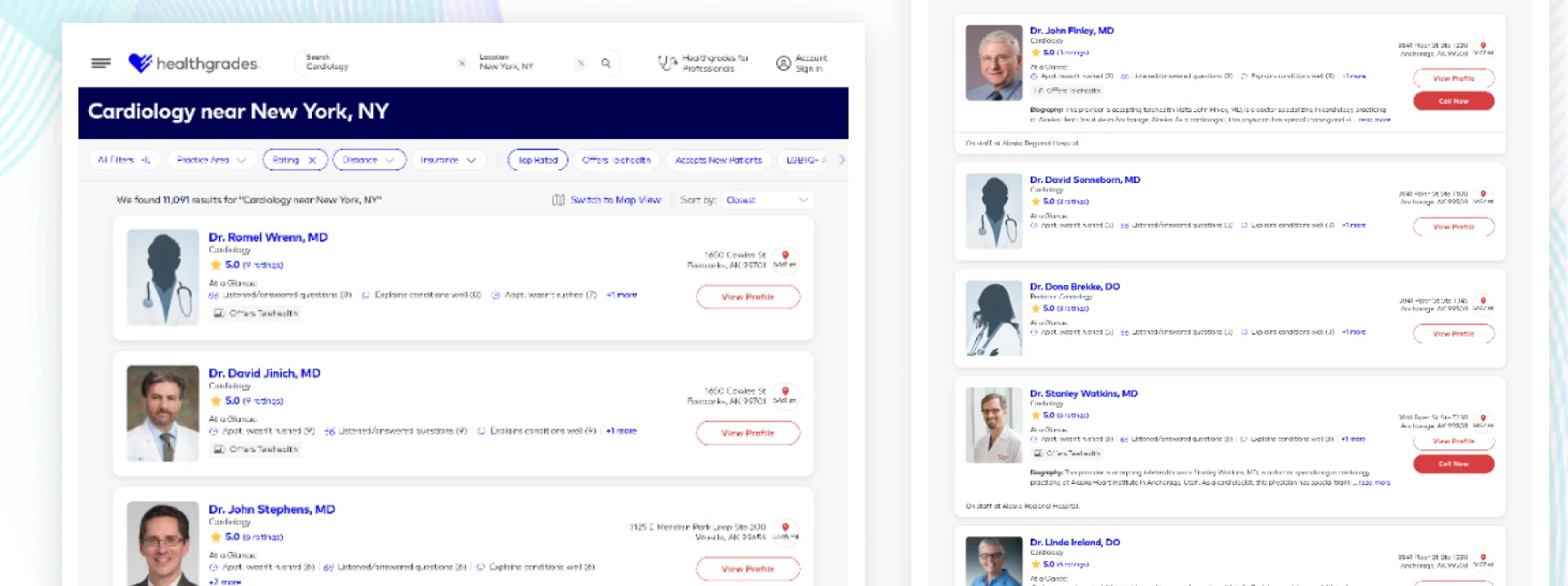
Ensure your healthcare website's success with solid technical SEO. This foundation helps search engines crawl, index, and rank your site effectively.
Page load time plays a significant role in both user experience and search engine optimization (SEO). Use tools like Google PageSpeed Insights to identify and optimize pages that load slowly. Compress images, eliminate unnecessary scripts, and optimize browser caching to make your website load faster. For SEO in healthcare, improving speed is crucial, as patients expect fast and responsive websites when searching for medical services. Take a look at @mayoclinic website speed performance on Google PageSpeed Insights.

Secure your site with an SSL certificate. Secure sites rank higher in Google search results, and they also safeguard patient data, which is crucial in SEO for the medical field. Ensuring that your site is safe to use builds trust with visitors and search engines.
Utilize schema markup to allow search engines to comprehend your content better. Create a local business schema for your practice and FAQ schema for health-related questions. This will cause your site to appear as a rich snippet in search results. It is essential to note that in SEO for hospitals, structured data is crucial in helping search engines effectively highlight your services, leading to better rankings.
Keep your XML sitemap up to date and submit it to search engines. It allows search engines to crawl your website more effectively. Also, verify your robots.txt file to make key pages crawlable. This is particularly important for SEO for the healthcare industry, as it ensures that all critical pages related to patient care, treatments, and services are visible to search engines.
Regularly scan Google Search Console for crawl errors and take action to correct them as soon as possible. This will allow search engines to crawl all pages of your site, helping you achieve the best SEO for hospitals. Fixing these errors ensures that all content is indexed correctly and can be found by patients when needed.
Local SEO is crucial for healthcare providers as it helps them connect with patients in their geographical area. Here’s how to make the most of local SEO for your healthcare practice: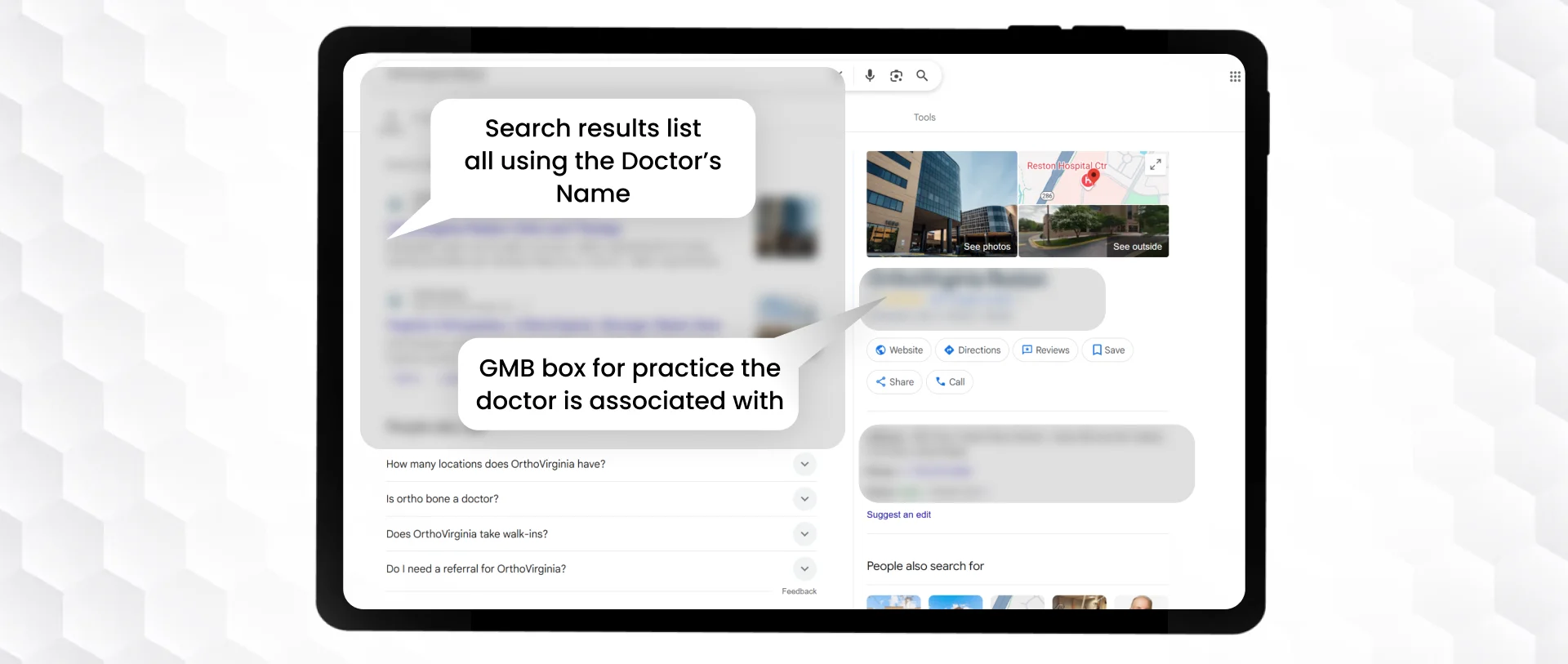
Optimize your Google My Business (GMB) fully. Verify your name, address, and phone number (NAP) across all sites. Include correct business hours, services, and a great description. For SEO for hospitals, ensuring that all your business details are accurate across online platforms helps you rank better in local search results. Encourage patients to post reviews, as they contribute to your local ranking and help improve trust in your SEO efforts for the healthcare industry.
Implement location-based keywords on your website, like “best cardiologist in [City]” or “pediatrician near me.” These local SEO tactics are crucial for hospitals, ensuring that you appear in local search results when potential patients are looking for healthcare services in your area. Location-based keywords not only improve rankings but also bring in patients who live in your neighborhood.
Make content that relates to the local population. Make blog entries about health trends locally, events, or health tips that appeal to individuals in your area. This localized approach helps enhance your relevance and visibility within the SEO in the healthcare industry, driving organic traffic and improving rankings.
Content marketing is a crucial component of SEO for the healthcare industry. By providing helpful, informative, and patient-focused content, you can captivate and retain visitors while improving your SEO results. Below is the way to integrate content marketing into your healthcare search engine optimization strategy:
Create informative blog posts, guides, and articles that address frequently asked questions patients may have. For instance, you could write "How to Prepare for a Heart Surgery" or "What to Expect During Your First Dermatology Appointment." These types of content will improve your SEO for medical practice by directly addressing patient concerns and establishing your authority in your field.
Emphasize content that directly benefits patients. Develop resources that help them make informed decisions, such as patient testimonials, frequently asked questions (FAQ) pages, or service descriptions. Make your content clear, empathetic, and appealing to your audience to improve both the user experience and SEO in healthcare.
Add videos or infographics to simplify complicated medical subjects. Videos enhance engagement and are highly shareable on social media, which can help increase your reach and visibility in SEO for medical purposes. For instance, produce a short video titled "Managing Diabetes" or share patients' success stories. These visual tools can also boost your search engine ranking by encouraging higher engagement.
Freshen up previous blog posts and content to keep them current and relevant. Repurposing existing content into different media, such as infographics, webcasts, or webinars, will not only extend the longevity of your content but also attract new patients to your site. This practice improves your SEO for healthcare by keeping your content fresh and up to date.

You don’t need dozens of tools to manage SEO, just the right ones. Here’s a curated tech stack for healthcare providers that want to improve search rankings, user experience, and content quality.

Even the best-intentioned healthcare websites get SEO wrong. Here are some of the most common mistakes and the solutions to them:
The majority of patients currently search from mobile devices, and voice assistants rank high among them. If your website isn't mobile-friendly or designed to receive natural language searches, you're losing traffic.
Fix it: Ensure your website features a mobile-responsive design and optimize your pages for conversational voice searches, such as “best pediatrician near my location.” This is essential for effective SEO in healthcare, as it improves user experience and accessibility.
Healthcare content should be thorough and medically accurate. Vague, repetitive, or outdated content on pages will suffer penalties from Google's YMYL (Your Money or Your Life) algorithm, especially for SEO for medical websites.
Fix it: Utilize expert-reviewed, in-depth material that provides clear answers to patients. Cite reliable medical sources and update the material periodically to ensure your content ranks well in search engines.
Inconsistent data, such as name, address, and phone number, across sites like Google Business, Yelp, and Healthgrades confuses patients and search engines alike. For SEO in healthcare, consistency across all platforms is crucial.

Fix it: Use tools like Moz Local or BrightLocal to audit and ensure consistency of your name, address, and phone number across all listings for accurate local SEO for your practice.
Reviews influence rankings and patient choice. Lacking them or ignoring them will damage one's credibility. Patient feedback plays a critical role in SEO for healthcare, as it affects local search results.
Fix it: Proactively ask for reviews from happy patients, respond responsibly to negative reviews, and regularly check sites like Google and Zocdoc. Positive reviews boost your medical SEO and foster trust with potential patients.
Your patients with disabilities should be able to access your site with ease. Failure to comply with ADA standards could also pose legal risks to you and negatively impact your SEO for healthcare.
Fix it: Use alternative text for images, maintain adequate contrast between text and images, make keyboard navigation possible, and enhance screen-reading compatibility. Tools like WAVE or SiteImprove can help ensure your website is accessible and optimized for search engines.
SEO for medical websites is undergoing rapid transformation. New technologies and changing patient behavior make it not only useful but also necessary to stay current.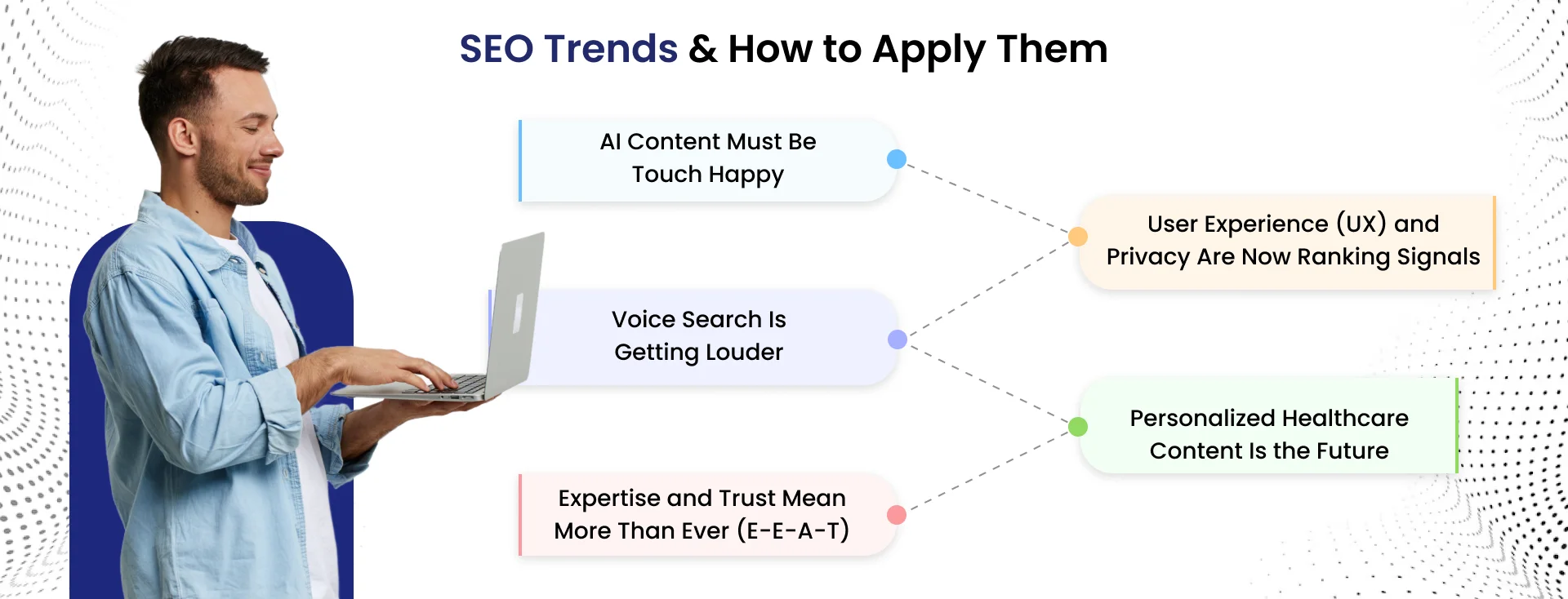
Artificial intelligence software such as Jasper, ChatGPT, and Frase makes it easier and faster to create content. The catch? Google now pays close attention to the helpful and trustworthy nature of the content. If the AI-generated content seems mechanical or inaccurate, it can negatively affect your rankings.
What you can do:
Use AI tools to assist in brainstorming or speeding up the writing. Always edit, fact-check, and make the material your own. Bring in a human touch and medical precision, and make the material read as if it were for patients, not search engines.
More people are searching with their voice using phones and voice-enabled speakers. Rather than searching with the phrase “cardiologist Chicago,” they may ask, “Who's the top doctor for my heart in my area and accepts Blue Cross?” These longer, conversational searches are altering the type of content that should be composed.
What you can do:
Write like your patients talk. Use everyday language and answer common questions. Add FAQs on your site, and include keywords like “near me,” “open now,” or “accepting new patients.”
Google is putting even greater emphasis on E-E-A-T: Experience, Expertise, Authoritativeness, and Trust. This is particularly paramount for health sites, where false info could be harmful.
What you can do:
Highlight your qualifications. Include "About the Author" bios for your content developers. Link to reputable sources such as the NIH or the Mayo Clinic. Make patient testimonials, certifications, and your medical team's experience evident on the website.
Google prefers users to have a smooth, secure experience. If your website is slow and cumbersome or doesn't secure patient data, your rankings will suffer, despite the high-quality content.
What you can do:
Patients don't need generic content; they need answers that connect to them on a personal level. Whether location, symptoms, or condition, content that feels personalized performs better and ranks higher.
What you can do:
Make pages or blog entries for particular services, patient populations, or geographic areas (such as “Austin, TX Pediatric Care”). Utilize data responsibly and in a manner that provides targeted content, and think about email automation to deliver helpful info based on user action.
Establishing a strong online presence for your healthcare practice doesn’t happen overnight; it demands strategic expertise, consistent effort, and thoughtful planning. However, when executed correctly, it lays the foundation for attracting more patients, building lasting credibility, and strengthening your brand’s reputation in an increasingly competitive market.
SEO is not a one-time effort but an ongoing commitment that requires careful management and expert insight. That’s where healthcare SEO services come in. With extensive experience in healthcare marketing, JanBask Digital Design offers tailored SEO strategies designed to boost your search visibility, attract the right audience, and support your long-term growth. Let us take care of your digital performance so you can focus on what matters most: delivering exceptional care to your patients.
S
A well-structured guide on healthcare SEO—practical tips that make complex strategies easy to understand. A must-read for medical businesses looking to grow online!
M
Clear, helpful, and practical. I had no idea Google Business Profile optimization was so important until reading this.
T
I loved how this blog avoided buzzwords and focused on real results. The advice on improving Core Web Vitals really helped our rankings.